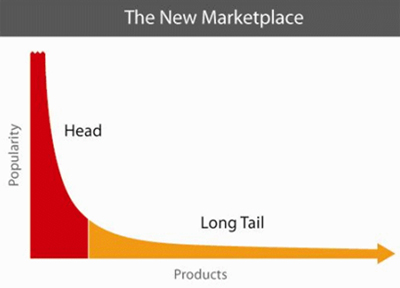This year my holiday reading list wasn't very long - I was too busy on the beach trying to follow the UK election on my phone (a sign of the times, eh). Nonetheless I did get to read one book: 'The Long Tail' by Chris Anderson.
In this fascinating tome, Anderson highlights how in this new-fangled age of e-commerce, online retailers are actually making more money out of selling lots of individual niche products than they are from selling hits. The classic example given in the book is Amazon: in a given week they may sell thousands of copies of a particular Coldplay album, but during the same time they will sell far more albums by a variety of less-well known artists.
This creates the 'long tail effect', which is illustrated in the diagram below. On the left hand side of the graph you see the million-selling acts, seemingly way more popular than everybody else. On the right hand side you see the 'long tail' of all the other less popular niche artists that don’t sell as many copies of their albums. But because digital distribution has allowed literally anybody to sell albums online, there are now so many niche products available for sale that the tail goes on and on and on…until all the products that sell one or two copies a year actually generate more profit, when considered together, than the hits that might sell millions in a year. The little guys actually pack more of a sales punch.

This is great, obviously, for Amazon and other online retailers - all they have to do is stock as much stuff as possible. But what are the implications for all the niche artists - like yours truly? Well, to be honest, I don’t think the long tail effect helps niche artists that much in strict retailing terms. The best application of 'the tail' for generating music sales is probably to make as much of your music as possible available to buy – somebody’s going to want to buy that alternative nu-metal-emo-dance remix you did of some crappy B-side, so why not let them (the downside though is that putting ropey content out there may not be great for your artistic integrity or image).
However, what may help musicians a bit more is another long tail effect: the long tail of media. If you look again at the chart above, and this time think of the left-hand side of the graph as containing the big publications – national newspapers and magazines – and the right hand side of the chart as containing the bloggers (or online content creators), it becomes clear that the bloggers actually have a bigger readership than the traditional media. A country may have 10 national broadsheets, which will be read by millions of people a day, but millions of people in that country will be creating content on blogs or social networks every day which is read by 10 or more people a day.
Needless to say it’s fantastic for bands if they can get into conventional print publications – as this is brilliant for profile and will no doubt also influence what bloggers are writing about – but it’s bloody hard. In the absence of success in that area, the long tail of media points to an alternative strategy for musicians who need exposure. This is to convince a critical mass of bloggers and other content creators to advocate their music. This is not by any means an easy process – it requires a lot of targeted approaches, and a lot of email-writing, but if done properly, at least it offers some exposure instead of none. The digital revolution has created a situation whereby decent bands who had no hope of getting national press can now at least get their music written about and crucially, heard by a potentially large audience.
Of course, this probably fuels the creation of demand for niche music - and helps Amazon sell more of it. So perhaps the biggest lesson of all this is that if you're in a band you should probably give up now and go work for Amazon!
More Chris Singleton content